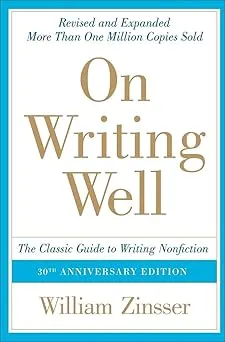About this book
Five Key Takeaways
- Writing requires hard work and consistent discipline.
- Effective writing prioritizes clarity and impactful word choice.
- Unity in writing enhances coherence and reader engagement.
- Nonfiction writers must embrace their craft's validity and power.
- Developing a unique voice fosters connection and authenticity.
-
Treat Writing as a Job
Writing demands consistent commitment and discipline, much like a regular job. It's not solely about inspiration striking; effort drives success.
Develop a daily writing routine. Approach writing as a craft that needs constant refining, not as purely artistic inspiration-driven work.
This process involves revisiting, rewriting, and honing individual sentences to achieve clarity. Prioritize the quality of each word and sentence.
Discipline fosters results. Writing every day sharpens your thinking and helps overcome writer's block. Pushing through difficulties builds resilience.
With perseverance, you'll refine your thoughts, improve clarity, and share authentic, impactful messages that resonate deeply with readers.
Failing to treat writing seriously can lead to stagnation and frustration. Discipline keeps your craft growing and evolving meaningfully.
Ultimately, a consistent approach transforms writing from a daunting task to an empowering tool for self-expression and connection.
-
Good Words Create Strong Connections
Carefully chosen words enhance communication by fostering precision and relatability (Chapter 3). Misused or hollow words dilute writing's effectiveness.
The dynamic nature of language enables writers to adapt to new words while preserving core grammatical rules. Both clarity and innovation matter.
Clear communication strengthens relationships, as intentional word choices connect better with readers. Words with clear imagery hold lasting impact.
Conversely, inappropriate or trendy words risk alienating readers by undermining the text's credibility. Consistency and relevance prevent this.
Good word usage builds the foundation for authority and respect in writing. Readers appreciate effort made to deliver relatable, direct content.
As language evolves, maintaining this balance ensures that texts resonate across generations without losing their original clarity and appeal.
Ultimately, precise word choice creates writing that delivers value, engages readers effectively, and stands the test of time.
-
Unity Anchors Effective Writing
Disjointed writing confuses readers and undermines the author's message. A lack of unity in style, tone, or structure causes distractions.
Writers need to establish clear direction before drafting, making choices around tense, pronoun usage, and tone consistently throughout.
Without focus, the reader's experience becomes disjointed, hindering comprehension. Clarity and cohesion help retain attention and build trust.
To address this, authors should narrow the scope of their topic, allowing each piece to focus on delivering a singular impactful point.
William Zinsser suggests flexibility as key. Flow adjustments during drafting often reveal new insights and force better focus (Chapter 4).
All writing choices—from structure to tone—should align with achieving unity. This delivers maximum impact while respecting readers' time.
Unity ensures that each element works together seamlessly, making communication impactful, compelling, and worth reading.
-
Develop an Authentic Voice
Your writing voice is the most significant tool for connecting with your audience. An authentic tone resonates universally.
To develop your voice, embrace individuality. Avoid clichés, over-polished styles, or fake personas; let your true self shine through.
Personal experiences and honesty enrich writing. Experiment constantly with styles to ensure your voice strengthens with practice.
An authentic voice adds relatability and personality to even factual content. It directly engages readers, enhancing their connection with your work.
Maintaining authenticity can foster trust and loyalty from readers, building a unique identity for your writing that distinguishes it from others.
However, an inconsistent or artificial tone risks alienating audiences, weakening impact. Authenticity always trumps over-polished language.
Ultimately, your voice creates a legacy that transcends content, allowing readers to truly understand and remember your words.
-
Simplify Scientific and Technical Writing
Science and technology writing often seems complex, scaring off readers. However, clarity can simplify any concept, making it accessible.
Break down explanations into linear, step-by-step structures. Explain ideas clearly without relying on the technical knowledge of your audience.
Use the "upside-down pyramid method,” beginning with a clear fact and gradually expanding into broader explanations (Chapter 7).
This method builds reader comprehension incrementally. Focusing on their perspective ensures scientific knowledge is simplified for everyone.
Writing in this way helps readers engage, understand, and enjoy topics often perceived as dense or intimidating.
By transforming technical complexity into relatable narratives using simple language, writers expand access to valuable scientific knowledge.
Achieving this not only empowers wider audiences but also elevates their trust and appreciation for the author’s expertise.
-
Readers Seek Impactful Nonfiction Writing
The rise of nonfiction shows a cultural need for real-world stories over escapist fiction. This trend reflects readers' demand for relevant material.
Nonfiction writing addresses contemporary issues, informing and empowering readers. It's as vital as fiction in shaping cultural conversations.
This shift highlights that writing quality transcends genres. Factual storytelling done well matches fiction's literary depth (Chapter 5).
Readers value authenticity in nonfiction, connecting more deeply with texts rooted in real experiences rather than contrived narratives.
This indicates a new era for writers, where factual stories can evoke emotions as powerful as innovative fictional works.
Ignoring nonfiction’s validity means overlooking a significant, growing part of modern literature influencing people's thoughts and lives.
Ultimately, this growing space offers nonfiction authors unparalleled opportunities to inspire and engage their readers profoundly.
-
Business Writing Should Be Human
Corporate writing often becomes overly formal, distancing readers. This lack of personal connection creates disinterest and misunderstanding for audiences.
Readers crave relatable communication. Jargon-filled memos or technical speeches alienate employees, making engagement with materials difficult.
This outdated style hinders collaboration and relationship-building. Clear, warm writing reconnects businesses with their teams (Chapter 6).
Zinsser advocates replacing bureaucratic tone with approachable language. Employees then feel heard, valued, and engaged at a human level.
Clear writing creates an environment where honesty and connection flourish, transforming workplace communication into an effective tool.
When businesses prioritize clarity and warmth, employees perform better and form stronger bonds with the organization.
Ultimately, humanizing corporate writing nurtures trust while reflecting a company culture that values transparency and collaboration.




















